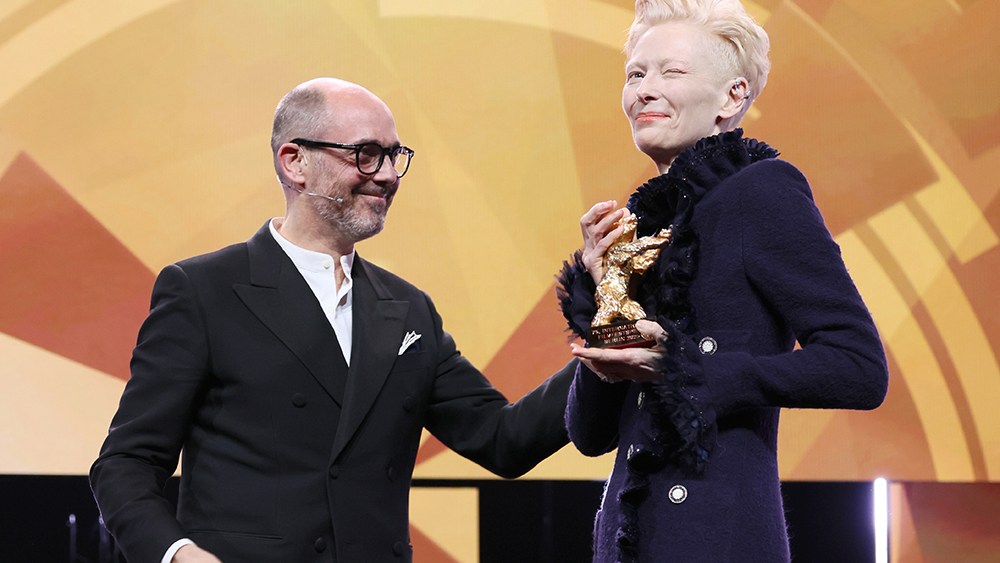The 75th annual Berlin Film Festival, one of the most esteemed events in the global film industry, kicked off on a snowy Thursday night with a mix of cinematic celebration and fiery political commentary. The festival, held in the heart of Germany, brought together filmmakers, industry executives, and movie stars who braved the slushy streets and icy pathways to attend the opening night. The event, known for its rich history and cultural significance, began with the screening of Tom Tykwer’s drama, The Light, a story about a dysfunctional married couple whose lives take a dramatic turn with the arrival of a new housekeeper. The film, starring Lars Eidinger and Nicolette Krebitz, set the tone for a festival that would blend artistry with activism, as many attendees and speakers used the platform to address pressing global issues.
The highlight of the evening came in the form of a powerful and emotional speech by the renowned actress Tilda Swinton, who was awarded an honorary Golden Bear for her lifelong contributions to cinema. Swinton, dressed in a stunning black sparkling coat, delivered a tearful address that resonated deeply with the audience. She praised the festival as a “borderless realm” that embodies the inclusive and unifying spirit of cinema, emphasizing its ability to transcend borders and resist forces of exclusion, colonization, and oppression. Her speech took a sharp turn toward politics as she criticized the complacency of governments that prioritize greed over the well-being of people and the planet. Swinton also appeared to reference a controversial suggestion by former U.S. President Donald Trump that Gaza could be transformed into a luxury resort, calling it an example of the world’s “inhumane” actions. Her impassioned words were met with applause and solidarity from the audience, underscoring the festival’s role as a platform for both art and activism.
The political theme continued with remarks from Todd Haynes, the festival’s jury president, who reiterated the importance of standing up for freedom of expression and diversity. Haynes’ comments echoed the broader sentiment of the evening, as the festival sought to position itself as a defiant counterpoint to rising global authoritarianism and cultural polarization. However, the opening night was not without its logistical challenges. Outside the screening of The Light, the wintry weather caused chaos, with icy pathways leading to the theater and ushers shutting down the entrance before all ticket holders could enter. Several guests were left stranded on the ground floor, unable to reach their seats, and were later directed to open spots in the balcony. Despite the hiccups, the festival’s new chief, Tricia Tuttle, greeted the audience with warmth and humor, acknowledging the cold night and her efforts to learn German, a nod to the festival’s cultural roots.
In recent years, the Berlin Film Festival has faced challenges in competing with the glamour and star power of events like Cannes and Venice, but this year’s lineup suggests a renewed focus on attracting high-profile films and talent. The festival is set to make headlines with the European premiere of Bong Joon Ho’s highly anticipated sci-fi film, Mickey 17, starring Robert Pattinson as a human voyager and his clones. Pattinson, who has gained a massive following from his role in the Twilight saga, is expected to draw significant attention ahead of the film’s global release in March. Another major draw is the scheduled appearance of Timothée Chalamet, who is actively campaigning for his role in the Bob Dylan drama, A Complete Unknown. Chalamet’s last-minute visit to Berlin reflects the growing influence of the European branch of the Academy of Motion Picture Arts and Sciences, as Oscar nominees increasingly court international voters in the final stretch of awards season. Other notable attendees include Jacob Elordi, star of the hit series Euphoria, who will promote his new project, The Narrow Road to the Deep North, directed by Justin Kurzel.
The festival’s political undertones were further amplified by Todd Haynes’ earlier remarks about the global crisis under Donald Trump’s second term as U.S. President. Haynes expressed concern over the rapid pace of policy changes in the first weeks of the Trump administration, which have caused shock and alarm among his friends and colleagues in the U.S. and abroad. The festival also took place against the backdrop of political tensions in Germany, where crucial general elections are scheduled for February 23. The right-wing Alternative for Germany (AfD) party has been a source of controversy, particularly after its officials were invited and then disinvited from last year’s Berlinale opening ceremony. The party’s anti-immigration rhetoric has heated up the campaign trail, and earlier that day, an Afghan asylum seeker drove his car into a crowd at a trade union demonstration in Munich, injuring at least 28 people. Festival host Désirée Nosbusch acknowledged the incident during her opening remarks, expressing solidarity with the victims.
Despite these challenges, the Berlin Film Festival remains a beacon of hope and unity, offering a space for filmmakers and audiences to come together and engage with stories that matter. The festival’s organizers emphasized their commitment to safety and security, ensuring that all visitors can enjoy the event without fear. With its diverse lineup, high-profile attendees, and unwavering commitment to artistic expression, the 75th Berlin Film Festival promises to be a memorable and impactful event. As the world grapples with uncertainty and division, the festival serves as a timely reminder of cinema’s power to inspire, challenge, and unite people across borders and boundaries.
